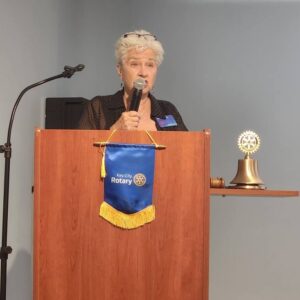
I’ve been asked to write a few thoughts on Leadership – probably because I’ve been President of the Key City Rotary Club (KCR) for three months now. I’ve held leadership positions before, but this is the first time I’ve been President of an all-volunteer organization. That requires a slightly different approach. Here are some lessons I’ve carried with me. Some I already “knew” (but didn’t always practice well), and some I’ve had to learn all over again.
How To Have a Good Season of Service
Have a plan; set some goals.
While it might sound axiomatic, I’ve found that without goals, it’s easy to ‘go with the flow’ and to respond to whatever shiny object is put in front of you.
Although response is important (more on that later), goals help you to stay focused and to make sure that what you’ve dreamed of accomplishing actually gets accomplished.
It’s also important, once you’ve set these goals, to check in with them periodically. Are you as far along in meeting them as you should be at this point in time? If not, what do you need to do to get back on track?
Don’t create your goals in a vacuum.
As you go about setting your goals, ask yourself, what does my community/ club/ organization need? And if you don’t know – ask them!
At KCR, we set our strategic initiatives as a club, inviting detailed feedback from club members. My goals stem from these initiatives.
Along with this, encourage your team (in the case of KCR, the Committee Chairs) to set goals for their own committees, ideally in line with yours. That way you’ll promote everyone working toward one unified purpose.
 Be responsive.
Be responsive.
You won’t be able to act on every email, every text, every question, every request that comes in as soon as you get it. But you can let the requester know that you’ve received their question and will get back to them as soon as you’ve gathered the appropriate information and had a chance to consider it. Then do it.
I use my email to help with this. Once I’ve read an email that requires follow-up, I mark it as ‘unread’ so that the bold emails become a, albeit somewhat Jenga’d, to do list. This is why I prefer not to handle club business using text – it’s too easy to lose track once a message is read.
Offer and give support when asked.
Don’t give assistance when not asked unless it’s clearly needed. Being micro-managed drives most people up the wall. You’ve got your team in place; trust them to do their thing.
If you find things aren’t being done, give a gentle nudge, ask the team if they need help and if so, what would that look like. If you find things are going off the rails, it may be time to pull them gently back in.
Make your reaction proportionate to the situation. There’s very little that can’t be fixed.
Don’t go rogue yourself.
Almost every leader is accountable to someone else; in the case of KCR, and most organizations, it’s a board. Keep them informed about what you’re doing, what you’re planning, and how they can help you.
I won’t pretend that sometimes I haven’t asked forgiveness rather than permission, usually in the interest of time; but I do it judiciously and only when I’m confident the board will agree.
Avoid favoritism and definitely don’t ‘bad mouth’ anyone in the club. I know this sounds like middle school and Mean Girls, but honestly, I’ve seen it happen (from a former pastor, no less), and nothing unravels unity faster.
As a leader, you should model respect and quell division; it’ll happen on its own unfortunately, with no help from you.
Leave your mark; make something your own.
This might sound contradictory to the earlier point about working together with your team, and perhaps it is. But even while working as a team, you can bring your own stamp to the role.
Leadership is about inspiring others to believe in something you care about. And often, what people remember isn’t a specific accomplishment or project you brought about, but the kind of leader you were.
Listen. Ask questions. Draw people out.
Obviously you’ll need to talk some, but once you’ve had your say, or better yet, before you’ve had your say, find out what others think.
I’ve never thought of this as a ratio, but perhaps 15% you talking, 85% everyone else would be a good rule of thumb.
Express your gratitude.
Gratitude has always been my maxim, so much so that, at age 77 I had it tattooed on my arm (!). Feeling appreciated can go a long way in motivating people and just generally making them feel good.
The more specific your gratitude, the more effective (someone just told me that they appreciated my ‘focused’ leadership – guess I fooled her!). But I don’t express my gratitude with any particular motive in mind; I truly am grateful.
I know I couldn’t do any of what I’m doing, as a Rotary President or even in life – without a cadre of people – like you – beside me.
 So, What Does It All Add Up To?
So, What Does It All Add Up To?
At the end of the day, leadership isn’t about titles, emails, or even goals on paper. It’s about how you show up with people.
Plans matter but so does listening. Accountability matters but so does gratitude.
If I’ve learned anything these past few months, it’s that leadership is less about being in charge and more about being alongside.
And if I can do that with some focus, a little humor, and a lot of thanks, you’ll have to forgive me if I call that a win.
~ Pat Hanberry, 2025-6 President, Key City Rotary
